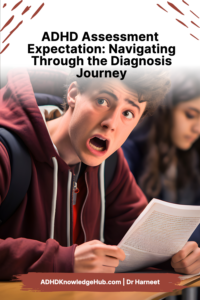ADHD Assessment Expectation: Navigating Through the Diagnosis Journey
Understanding ADHD
Attention Deficit Hyperactivity Disorder (ADHD) is a condition that, despite its challenges, comes with a unique set of strengths. It’s not just about being easily distracted or overly energetic; it’s about navigating the world with a brain that’s wired differently. This neurodevelopmental disorder affects both children and adults, influencing their attention span, impulse control, and activity levels. Understanding and completing an ADHD assessment is paramount because it lays the foundation for empathy, self-acceptance, and tailored interventions.
The Importance of Accurate Diagnosis
The journey toward an accurate ADHD diagnosis is often fraught with misconceptions and oversimplifications. Many believe that ADHD is overdiagnosed or merely a product of modern society’s fast-paced lifestyle. However, a precise diagnosis is a gateway to understanding and managing the condition effectively. It’s about more than just labeling; it’s about unlocking a tailored approach to treatment that considers the individual’s unique challenges and strengths. Accurate diagnosis is a critical step in demystifying ADHD and debunking myths that surround it.
Preparing for an ADHD Assessment
What to Expect Before the ADHD Assessment
The anticipation of an ADHD assessment can stir a whirlwind of emotions. You might find yourself oscillating between hope and apprehension, eager for answers yet wary of labels. It’s a pivotal moment that promises clarity and, potentially, a new beginning. Preparing for the assessment involves both practical and emotional readiness. Gathering all pertinent documents, such as educational records, medical history, and any notes on behavior patterns, is just as important as mentally bracing yourself for the journey ahead.
Finding Calm Before Your ADHD Assessment: Embracing All Possible Outcomes
Feeling physically sick before an ADHD assessment is understandable, given the mix of nerves and anticipation. It’s important to remember that this feeling is a natural response to the unknown, and you’re certainly not alone in experiencing it. This assessment is not just about diagnosing ADHD; it’s a comprehensive look at your unique cognitive and emotional landscape. It’s entirely possible that the outcome may indicate you don’t have ADHD, and that’s okay. In such cases, your psychiatrist is prepared to explore other explanations for your experiences and offer guidance on strategies and support tailored to your specific needs. Take deep, calming breaths and try to view this process as a positive step toward understanding yourself better, regardless of the outcome. This is about finding the right support for you, ensuring that you have the tools and knowledge to navigate life’s challenges more effectively. Remember, you’re taking a brave step towards self-improvement, and that in itself is a significant achievement.
My Enhancement of the ADHD Checklist for Patient Assessment
As the founder of the ADHD Knowledge Hub and a devoted practitioner, I’ve always sought ways to enhance the understanding and management of ADHD. With this mission in mind, I personally refined the “ADHD Checklist” available on my website, aiming to make it an indispensable tool not only for my practice but for anyone seeking clarity on ADHD symptoms. This enhanced checklist is the result of my commitment to provide comprehensive support and insights into the ADHD journey. It’s designed to foster a more precise and empathetic conversation between healthcare providers and those experiencing ADHD symptoms, by highlighting the varied and unique manifestations of ADHD. My goal in sharing this checklist is to empower individuals with the knowledge they need as they navigate their path to diagnosis and management, ensuring they feel understood and supported every step of the way. Explore My Enhanced ADHD Checklist
Documents and Information to Bring to an ADHD Assessment
The documents you bring to your ADHD assessment are more than just paperwork; they’re pieces of a puzzle waiting to be solved. These documents give your healthcare provider a glimpse into your world, offering clues that piece together the narrative of your unique experience with ADHD. Whether it’s school report cards that hint at inconsistent performance, medical records outlining your health history, or personal notes that track your day-to-day challenges, each document contributes to a fuller understanding of your situation.
During the ADHD Assessment
The Role of a Healthcare Professional
The healthcare professional conducting your ADHD assessment is more than just a clinician; they’re a detective of sorts, piecing together the evidence to understand your story. Their expertise allows them to navigate the complex terrain of ADHD, distinguishing its symptoms from those of other conditions and understanding its impact on your life. Through a series of tests and conversations, they aim to build a comprehensive picture of your experiences, strengths, and struggles.
Types of Tests and Questionnaires
- Cognitive Assessments: These tests are designed to measure your mental capabilities, such as memory, attention, problem-solving, and flexibility in thinking. They’re not about judging intelligence but understanding how your brain processes information.
- Behavioral Interviews: This part of the assessment involves a deep dive into your behaviors, emotions, and daily functioning. It’s a conversation that seeks to uncover how ADHD symptoms manifest in your life, affecting everything from work to relationships.
After the ADHD Assessment
Interpreting the Results
Receiving the results of your ADHD assessment can feel like a moment of reckoning. It’s a convergence of anticipation and reality, where the abstract becomes concrete. The interpretation of these results is a nuanced process, one that goes beyond mere diagnosis. It’s about understanding the specific ways in which ADHD affects you and outlining a path forward that addresses your unique challenges and leverages your strengths.
Next Steps After Diagnosis
Being diagnosed with ADHD can be a watershed moment in your life. It’s as much about understanding what it means for you as it is about planning the next steps. These steps might involve exploring medication options, engaging in therapy, or implementing lifestyle changes aimed at managing symptoms. Each step is a building block in constructing a life that not only accommodates ADHD but also celebrates the unique perspective it offers.
Treatment and Management Options for ADHD
Medication and Therapies
The treatment landscape for ADHD is diverse, offering a range of options tailored to individual needs. Medications, such as stimulants and non-stimulants, can play a crucial role in managing symptoms, improving focus, and reducing impulsivity. However, therapy—be it cognitive-behavioral therapy (CBT), psychoeducation, or coaching—provides the tools to navigate daily challenges, offering strategies for organization, time management, and emotional regulation.
Lifestyle Adjustments and Support
Living with ADHD is an exercise in adaptation. It’s about finding the routines, habits, and supports that align with your unique way of experiencing the world. Simple lifestyle adjustments, such as establishing consistent routines, optimizing your environment for focus, and engaging in regular physical activity, can have profound effects. Moreover, leaning on the support of friends, family, and support groups can provide a sense of community and understanding.
Overcoming Challenges and Stigma
Dealing with Societal Misconceptions
Educating those around you and advocating for yourself are vital in overcoming stigma and misconceptions about ADHD.
Finding Community and Support
Connecting with others who understand the ADHD journey can provide comfort, insights, and a sense of community.
Tips for Living with ADHD
Organization and Time Management
Adopting strategies for organization and time management can help mitigate the impact of ADHD on daily life.
Seeking Professional Help
Never hesitate to seek professional help. Therapists, coaches, and support groups can offer guidance and support tailored to your needs.
Conclusion: ADHD Assessment
Navigating life with ADHD is a journey of highs and lows, challenges, and triumphs. It’s about learning to embrace your neurodiversity as a part of who you are, recognizing the unique strengths it brings along with its challenges. By understanding ADHD, preparing for assessments, and exploring treatment options, you can pave a path that not only accommodates your needs but also celebrates your unique perspective and talents. Embrace this journey with an open heart and mind, for it is filled with opportunities for growth, learning, and self-discovery.
FAQs
- What is the most effective treatment for ADHD?
The most effective treatment for ADHD often combines medication, such as stimulants and non-stimulants, with behavioral therapies. Cognitive-behavioral therapy (CBT), psychoeducation, and coaching can be particularly beneficial. The best approach is highly individualized, depending on the person’s symptoms, lifestyle, and preferences. - Can adults be diagnosed with ADHD?
Yes, adults can be diagnosed with ADHD. While ADHD is often recognized in childhood, many adults may have gone undiagnosed. Symptoms can manifest differently in adults, including challenges with organization, time management, and maintaining focus in work or relationships. - How long does an ADHD assessment take?
An ADHD assessment can vary in length but typically takes several hours to complete. The process may require multiple sessions to gather comprehensive information through interviews, questionnaires, and cognitive tests, ensuring a thorough evaluation. - Are there any natural remedies for managing ADHD?
While medication and therapy are the primary treatments for ADHD, some natural remedies can support overall well-being. These include a balanced diet, regular exercise, adequate sleep, mindfulness practices, and omega-3 fatty acids. However, it’s important to discuss any natural remedies with a healthcare provider to ensure they complement your treatment plan effectively. - How can families support a loved one with ADHD?
Families can support a loved one with ADHD by fostering an understanding and supportive environment. This includes learning about ADHD, providing structure and consistency, helping with organization and time management, and encouraging them to seek professional help. Listening, offering encouragement, and recognizing their strengths and efforts are also crucial.

*We may earn a commission for purchases made using our links. Please see our disclosure to learn more.




